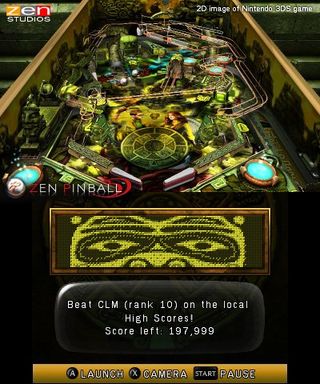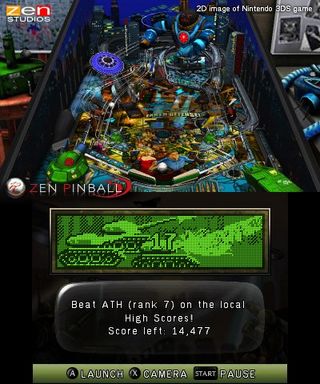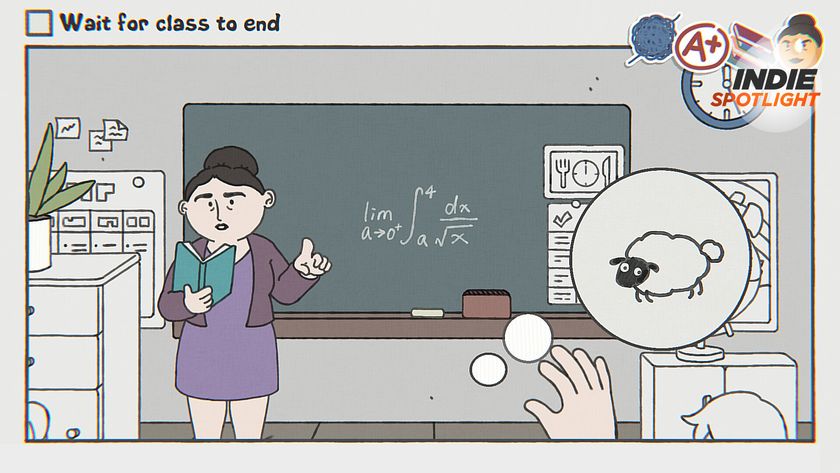12DOVE Verdict
Pros
- +
3D really adds to the experience
- +
Great
- +
realistic core gameplay
- +
Superb selection of tables
Cons
- -
Some useless camera angles
- -
Excalibur has a couple annoyances
- -
Seeing your score on the leaderboard
Why you can trust 12DOVE
If you’re familiar with ZEN Studios’ various pinball entries such as other Zen Pinball titles and the fantastic Pinball FX games, you already know that the base gameplay is great. The questions for Zen Pinball 3D, then, are what does the 3DS contribute to the formula, and are the tables on offer up to snuff?

We’d have to say that the 3DS is both a hindrance and a boon to playing pinball. You’d think that 3D is about as superfluous as a gimmick gets when it comes to something like pinball, but it actually enhances the experience a surprising amount. One of the great appeals of pinball is its physicality – a real table with real objects that have physics and where you can peer through the glass and admire all the cool details. With 3D effects, the tables gain that extra sense of physical space and weight you can’t get from 2D depictions. Playing with the slider all the way up gave us a bit of a headache, but the middle of the slider was a sweet spot we could enjoy for extended play sessions, and we just loved how the ball was an actual sphere rolling on the table.
The main problem with pinball on a handheld is that the screen is just too damn small. When we played Pinball FX on the consoles, we preferred a camera where we could see a full, top-down view of the table. This just isn’t feasible here as everything is way too small, so we had to opt for our less-preferable low-angle view which follows the ball around. We were able to get used to it, but it’s unfortunate that certain camera views (in fact, most of them in our experience) were useless.
As for the core gameplay, this is from veteran pinball designers ZEN Studios, who once again have nailed the physical feel of real-world pinball. If you have any worries about digital pinball that “just doesn’t feel right” then fear not, because this is as good as it gets. Everything has chunky weight to it, the flippers feel perfect, and the ball moves exactly as it should. You can use the shoulder buttons for the flippers but we don’t recommend it – they’re not conducive to fast reactions. The other controls, using B as right flipper and left on the D-pad as left flipper, work great after a short acclimation period. Be sure to mess with the various camera angles to find one you prefer.
The first table, Excalibur, has an obvious theme: knights, castles, dragons. Our preference is for a lot of ramps, so compared to the other tables Excalibur doesn’t quite fulfill our ramp addiction (we know it’s not rational, but there’s something about shooting the ball along something that reminds us of a roller-coaster or a waterslide). Still, it’s a well-designed board for the most part. It’s great how you can perform a multi-stage siege on the castle in the back, featuring one of the most complicated sequences we’ve ever seen: you have to unlock a gate, move a battering ram, get the ram to hit the gate, load a catapult/ballista thingy, and then fire upon the castle multiple times. Pulling it all off feels amazing. We also like the jousting minigame, where you have to perfectly time the launching of a ball against an advancing knight.
Excalibur does have a couple of design problems that we’re a bit surprised weren’t remedied through playtesting. The first is the placement of a “round table” object in the lower left, which spins around when you hit it. Bizarrely, if you launch your ball while aiming for a skill shot for the last slot in the upper part of the board, your ball will roll down, hit the spinner, and always fall down the side lane and be lost (your ball will be saved since it happens soon after launch, but then your “ball save” just got wasted). The other problem is that the catapult sits right over the area the ball rolls through to reach your left flipper – meaning much of the time you have to use the left flipper you can’t see the ball for a second, which can affect your prediction of motion. We should note that we spent a paragraph on these complaints because they take time to explain, not that they make the board bad. The board is on the whole great fun.
The second table is El Dorado, with a sort of Indiana Jones-style theme. The flow of ramps is great here, with a whole bunch of sweet, swirling highways of goodness to hit in rapid succession. We also enjoy the idol, which is a totem-pole-like feature where first you knock down barriers in front of a face, then shoot the ball in its mouth, and then the head rises from the table to reveal successive heads with more hungry mouths. The layout of this board is such that you’ll rarely encounter frustrating ball losses where you feel like you had no control – clever setups of simple obstacles and shapes ensure that most of the time the ball will roll in a way that you can deal with it.

Shaman is a tribal-themed board, including a cute little guy who plays conga drums when you hit him, a bunch of cool ramps that look like rickety wooden bridges, and some great upper board elements like a mini pinball area with its own flippers and a pachinko-like luck-based board of pins. We do feel that this board has its share of chaos where you might feel a bit robbed by how the ball rolls, but overall it’s solid. It has an extra flipper on the left side where if you get the timing down, you can repeatedly flip the ball to the opposite side and rack up a crazy score, which is very satisfying.
The last table is Earth Defense, with an alien-invasion theme. Man, this has some of the loveliest swooping ramps we’ve encountered in a table and you can really fly from one to the next in a zen-like continuous rhythm. There’s also a huge robot on the board that picks up balls, fires balls around the arena, shoots his guns off, and just adds personality to the whole thing.

Like ZEN Studios’ previous offerings, Zen Pinball 3D reproduces the best aspects of pinball beautifully, and the 3D truly adds to the enjoyment and gets you that much closer to feeling like you’re playing real pinball. The small screen limits the number of useful camera views, but then we’re not sure if there would be any way around that (we don’t think a dual-screen view would be any better). Don’t hesitate to pick this up if you love or even just like pinball, as this will satisfy those cravings admirably.
More info
| Genre | Arcade |
| Description | Like ZEN Studios' previous offerings, Zen Pinball 3D reproduces the best aspects of pinball beautifully, and the 3D truly adds to the enjoyment and gets you that much closer to feeling like youre playing real pinball. |
| Platform | "3DS" |
| US censor rating | "Everyone" |
| UK censor rating | "" |
| Release date | 1 January 1970 (US), 1 January 1970 (UK) |
Most Popular







